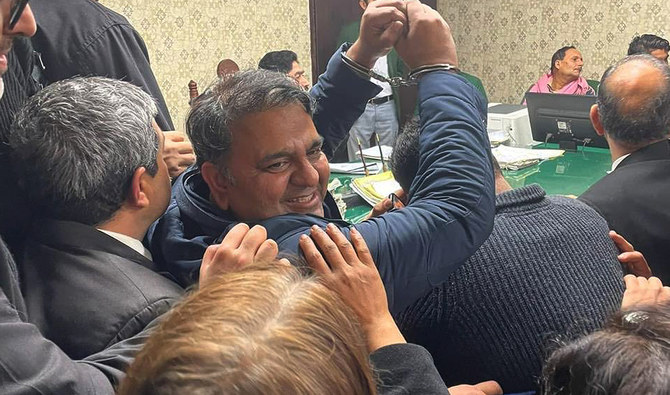ISLAMABAD: An Islamabad district court on late Wednesday night granted police a two-day physical remand of Chaudhry Fawad Hussain, a close aide to former prime minister Imran Khan, who was arrested on Wednesday morning in Lahore for alleged sedition, among other charges, over a complaint filed by the secretary of the Election Commission of Pakistan (ECP).
According to the complaint registered with an Islamabad police station, the ECP Chief Secretary Omar Hamid Khan has accused Hussain of ‘threatening’ members of the regulatory body. Charges have been filed against Hussain under sections 153-A (promotion of enmity between groups), 506 (criminal intimidation), 505 (inciting public mischief) and 124-A (sedition) of the Pakistan Penal Code.
Hussain’s arrest was first reported at 616am on Wednesday morning when Khan’s Pakistan Tehreek-e-Insaf party’s official Twitter account published videos of “police cars” it said were taking away Hussain.
The police case filed against Hussain refers to an interview he gave to the 92 News channel in which the complainant says the PTI leader had “threatened the chief election commissioner, other members of the election commission and their families through his speech and tried to obstruct the state’s election process.”
The police earlier presented Hussain before the Lahore Cantt court which allowed police to take Hussain to Islamabad on a transitory remand. Hours after his arrest, he was brought to Islamabad to present before a district court judge where police requested the court for an eight-day physical remand to complete the investigation in the case.
The duty magistrate Naveed Khan, however, granted police a two-day physical remand, directing them to present Hussain again in court on Friday.
“In view of the above facts and circumstance, [a] two days physical remand is granted,” the court order read. “The accused [Hussain] be produced again before the court on 27.1. 2023 before the concerned Judicial Magistrate after obtaining the report of medical examination,” it added.
During the hearing, the courtroom was packed to capacity with journalists, members of civil society, politicians and supporters of Khan’s Pakistan Tehreek-e-Insaf (PTI) party. Charged-up PTI supporters chanted slogans against the government and in Hussain’s favor.
The police presented Hussain in the court handcuffed and with his face draped in white cloth.
The former minister defended himself before the judge, seeking the dismissal of the case. “They [the police] have charged me with sedition for the criticism, if this happens then freedom of speech will cease to exist in this country,” he said.
Hussain said whatever he said in public was on the PTI’s behalf. “I am the party’s spokesperson and whatever I say, it represents my party’s policy. It is not necessary that whatever I say is my opinion,” he said.
Hussain complained police had confiscated his mobile phone, adding that he was kept in the counter-terrorism department “like a terrorist.”
His lawyers, Ali Bukhari and Qaiser Imam, also urged the court to dismiss the case against the former minister while pointing out legal lacunas in it.
“The court needs to examine if the charges slapped [against Fawad Hussain] were even applicable in the case,” Bukhari said, adding that Islamabad lacked the jurisdiction to register the case as Hussain made the remarks in Lahore, not in the capital.
The ECP’s lawyer, Saad Hassan, defended the charges against Hussain, saying the electoral watchdog was a constitutional body and the accused threatened its members of dire consequences in his speech.
“Fawad Chaudhry damaged the ECP’s reputation by issuing the threatening statement,” he said, adding that he also termed the chief election commissioner as ‘munshi,’ – a clerk or bookkeeper.
“Fawad Chaudhry has not apologized for his remarks as he is still standing by his statement,” the ECP lawyer argued. “His statement was aimed at inciting the public against the election commission.”
After hearing arguments from both sides, the judge reserved the verdict and later granted the police two-day physical remand of Hussain for interrogation.
Hussain’s arrest will pit Khan even more squarely against the Prime Minister Shehbaz Sharif government and the all-powerful military at a time of high political tensions and economic crisis in Pakistan.
Since being ousted from power in a parliamentary no-trust vote, Khan has refused to accept Sharif’s coalition government and campaigned for snap polls, holding protest marches and rallies across the country. In recent months, his relationship with Pakistan’s military, which is widely believed to have propelled his rise to the PM’s office, has also sharply deteriorated as he blames it, and its then army chief Gen Qamar Javed Bajwa, of being part of a foreign conspiracy by the United States to remove his government. Washington and the army deny the charge.
Khan and his party have in recent months been at loggerheads with the ECP and its current leadership, which they accuse of being biased in favor of the Sharif government. The ECP denies this. The regulator ruled against Khan in a case late last year related to his failure to disclose wealth earned from the sale of state gifts.
Hussain’s arrest comes months after another close Khan aide, Dr. Shahbaz Gill, was arrested by police and accused of inciting mutiny against the military. Gill is out on bail. Another PTI leader, Senator Azam Swati, was also arrested and released on bail in multiple cases, including for posting tweets considered to be anti-military.
Analysts say Khan, who was brought to power in a 2018 election with what is widely believed to be the military’s support, had fallen out with the powerful generals in his final months in office. In a recent interview, Khan said his party had “no relationship” with the new army leadership under General Asim Munir, who was appointed the new chief of army staff late last year.


















